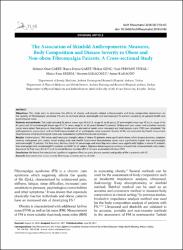The Association of Skinfold Anthropometric Measures, Body Composition and Disease Severity in Obese and Non-obese Fibromyalgia Patients: A Cross-sectional Study

Göster/
Erişim
info:eu-repo/semantics/openAccessTarih
2018Yazar
Cakit, Mehmet OnatCakit, Burcu Duyur
Genc, Hakan
Pervane Vural, Secil
Erdem, Hatice Rana
Saracoglu, Meryem
Karagoz, Aynur
Üst veri
Tüm öğe kaydını gösterÖzet
Objectives: This study aims to determine the effects of obesity and obesity related anthropometric and body composition determiners on the severity of fibromyalgia syndrome (FS) and to compare obese, overweight and normoweight FS patients according to general health and psychological status. Patients and methods: The study included 42 obese (mean age 48.8 +/- 11.6; range 24 to 65 years), 27 overweight (mean age 47.3 +/- 3.4; range 24 to 61 years) and 32 normoweight (mean age 47.1 +/- 7.8 years; range 31 to 60 years) female FS patients. Widespread pain scores and symptom severity scores were noted. Pain pressure thresholds of tender points and control points were measured and total myalgic score (TMS) was calculated. The anthropometric assessments and skinfold measurements of all participants were recorded. Quality of life was evaluated by Health Assessment Questionnaire while psychological status was evaluated using Beck Depression Inventory. Results: Control points, TMS values and hand grip strength values of obese FS patients were significantly lower, while disease duration, symptom severity, widespread pain scores, visual analog scale and Health Assessment Questionnaire scores were significantly higher than normoweight and overweight FS patients. Fat free mass, fat mass, body fat percentage and waist/hip ratio values were significantly higher in obese FS patients than overweight and normoweight FS patients (p<0.001 for all values). Stepwise linear regression analysis showed that increased body mass index, decreased fat free mass (R2=0.11) and increased disease duration (R2=0.13) were associated with lower TMS. Conclusion: We found that obesity had significant negative effects on pain, disease severity and quality of life in patients with FS.
Kaynak
ARCHIVES OF RHEUMATOLOGYCilt
33Sayı
1Bağlantı
https://dx.doi.org/10.5606/ArchRheumatol.2018.6180https://hdl.handle.net/20.500.12513/3625

















